Three years ago, Elmaz Çakalli, like many of his friends in Albania, decided to emigrate. At only 20 years old he set out for England, stopping first in France. He stayed there for three months before the state pushed him back with all his hopes.
His hometown, Bulqiza, is by no means an unknown place. For years it has been the subject of dozens of media stories about miserable working conditions in chrome mines ― large numbers of workers’ casualties, injuries, low wages ― which are often the only employment opportunity for thousands of locals. Recently, it was one of the miners of this country, Elton Debreshi, who ignited a spark of change by running for Parliament in the last national elections in April this year. Despite not winning enough votes to secure a seat, Debreshi, for a while, brought attention to the need of improving the working conditions of miners.
Chrome mining in Bulqiza is often the first job young people in this area find. Elmaz, now 23, started working in the mine at the age of 17, at first irregularly, without a contract or insurance, and then regularly after a year. As he describes the working process he has been carrying out for six years now, filling the wagons with chrome, he shares the feeling he experiences every day as he enters the gallery.
“When I enter the mine, first of all I carry the shroud under my armpits,” said Elmaz. “I carry it at all times because it is very dangerous ― from the entrance through the gallery floor, to work in spaces or pits that have no security.”
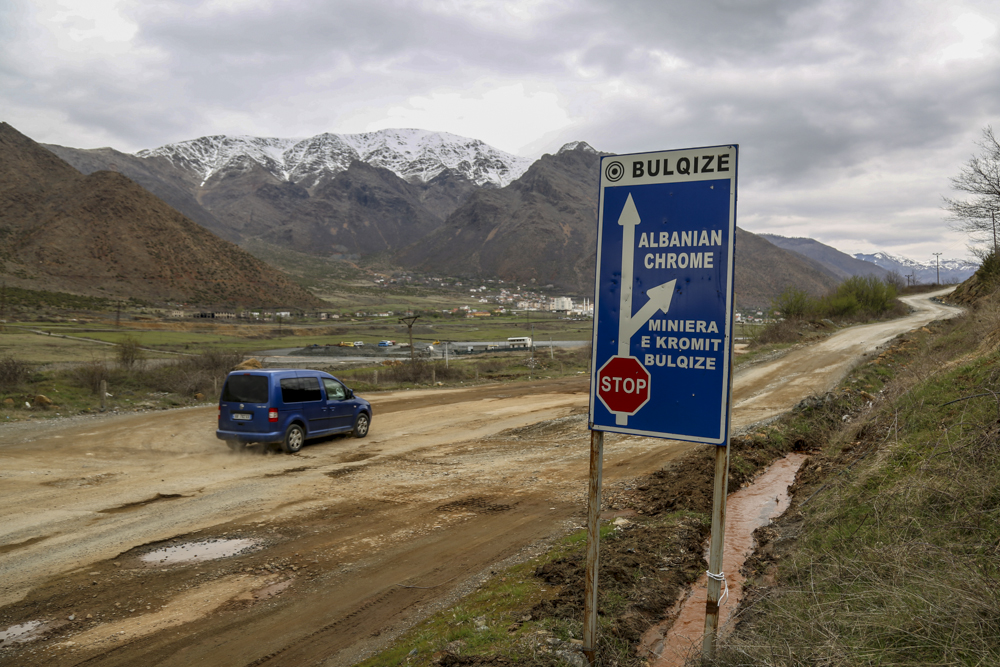
Bulqiza does not offer many opportunities for its inhabitants besides the chrome mines. Photo: David Hardy.
Generation after generation, this profession has been inherited in his family, from grandfather to father, and he does not hesitate to say that he fears his future children might have the same fate. Working conditions remain as in the past, and when miners go to work, they are always accompanied by fear.
“It is like this since the time of my grandfather, who told me a lot of stories, and also in the time of my father, who passed away in the gallery,” said Elmaz. “I am experiencing the same conditions; even worse, nowadays many veins have already been depleted and the remaining work is more intensive.”
Besides men, women and children also work in the mine. In many cases they lend a helping hand to their families, and often as the only way to earn some money after losing husbands and fathers in the mine. And this also came with a cost for them.
“We have had many cases of women working up in the open pit having a load of material unloaded on them from excavators when the driver did not see them,” said Debreshi. “Some children broke legs and arms while working there.”
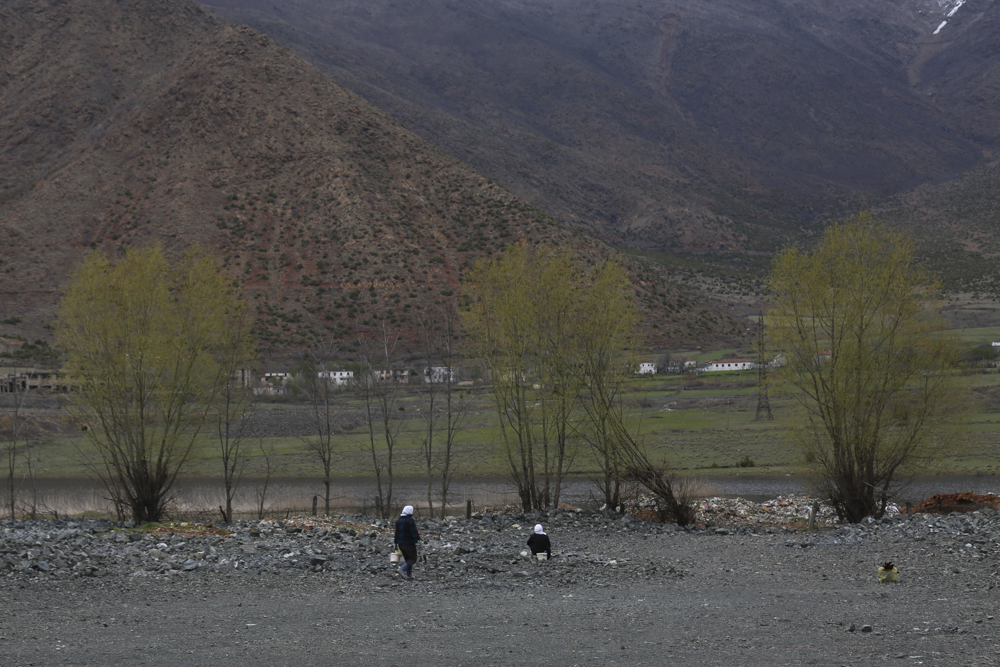
Many women in Bulqiza are forced to work in the open pit to help their families, often the only way to earn some money. Photo: David Hardy.
On May 28 this year, Bulqiza closed the day with the news that a 35-year-old man lost his life during a cave-in in a gallery operated by AlbChrome. AlbChrome, part of Balfin Group, which owns most of the mines in Bulqiza, took no responsibility and initially announced that the event occurred due to the miner’s negligence.
A day later, Dibër county police arrested a technician, charging him for violation of the rules of protection at work, a criminal offense, and prosecuted two overseers.
Four miners were injured and another lost his life in the first three months of 2021.
The event of May 28 was the continuation of a series of similar events throughout the year. On May 24, another miner was injured in the chrome galleries in Bulqiza, and a few weeks before, three miners suffocated in Martanesh, near Dibër, due to gasses released from the generator.
In addition to the above events, according to the State Inspectorate of Labor and Social Services four miners were injured and another lost his life in the first three months of 2021. During 2020, according to the Inspectorate’s annual analysis, five miners lost their lives and 28 others were injured, three of whom were women.
The loss of a formal miner status after the fall of the communist regime has deprived them of many rights, both working and after retirement. According to Debreshi, approving the miner status is the best answer for the residents of Bulqiza.
“If a miner loses his life in the gallery leaving behind children and spouse, they shouldn’t have to work the open pit to win bread for their families,” said Debreshi. “The state must guarantee that the family is supported by a dignified salary as befits a miner.”
Debreshi points out that unfortunately miners do not have a long life, so they want the status before they die.
An oilman cabbie to Ballsh…
A two hour drive from Tirana, the town of Ballsh, in the county of Fier, is relatively new. Ballsh was built about 35 years ago to satisfy the need for industrial development in this area with an Oil Refinery that became operational in 1978. This plant has provided jobs not only to Ballsh, but also the cities of Patos, Mallakastra, Kuçova and even Fier and its surrounding towns.
Eri, one of the taxi drivers lined up at the station looking for passengers to take to Ballsh, ironically knows the refinery situation well, as he worked there as an oilman. In small towns, particularly in Albania, it is impossible to avoid talking in the car, especially when everyone knows everyone.
In his mid 30s, with a background as an oilman, Eri has been working as a taxi driver for some time due to the interruption of work in the refinery. He is a graduated engineer and, immediately after completing his studies in Tirana, he returned to his hometown to work at the plant.
The suspension of work at the refinery derives from constant changes of management.
In September 2019, work on this plant was suspended, leaving 800 oil workers unemployed. Eri, who is also a member of the United Oil Workers’ Union, said that if the refinery is not put back to work, the whole area would die.
“We cannot stay here, I will flee as soon as the borders are open,” he said as he hurriedly drove the winding roads that lead to Ballsh amid greenery. At this time in May, the borders of Albania were still not fully open due to COVID-19.
The refinery is among the only employment opportunities in the area and if it were to be put to work he would be back there again, but he has lost all hope, considering how events have played out so far.
“Earlier, while the refinery was operational, the streets and the town had more life because of the workers who came and left the city,” Eri said.
The whole process that led to the suspension of work at the refinery derives from the constant changes of management, as the refinery went through numerous owners and companies who managed it in concession. This has resulted in wage arrears since the period of Taçi Oil, which started to accrue debts after buying the refinery in 2008.
Sokol Dautaj, an employee of the Ballsh refinery for 20 years and head of the United Oil Workers’ Union (SNB), said, “Since Taçi Oil announced bankruptcy, many companies have been brought in to manage our plant, accumulating an ever growing debt.” The union was established in 2020 as a reaction to the failure of older unions to address the concerns of oil workers.
“But our biggest misfortune happened as this debt began to affect workers, when wages stopped being paid,” said Dautaj, adding that the privatization of the refinery was once seen as a serious solution, but turned into debts to oil workers.
The wage process was also pursued legally. In September 2017 the Court of First Instance recognized the right of 505 workers to 13 arrears, in a decision that became final. However, it has not yet been implemented.
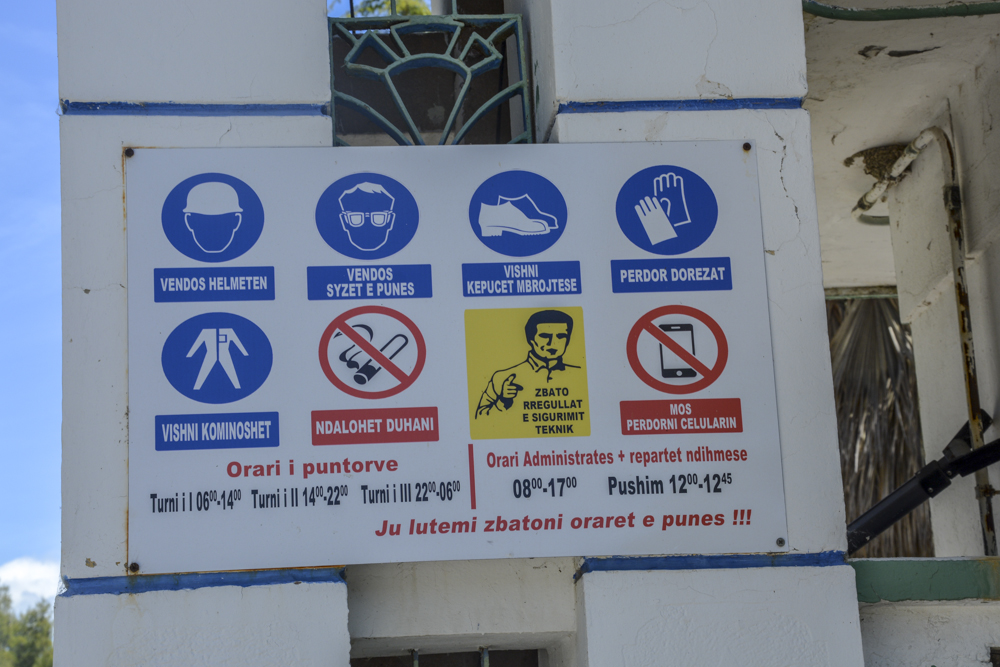
Since 2019, work at the Ballsh refinery has stopped and no one knows when it will resume. Photo: Erisa Kryeziu.
Unlike miners, oil workers are protected by the “Status of employees of the oil and gas industry,“, approved by Parliament in February 2017. This law, which benefits five thousand oil workers, recognizes their right to early retirement and priority hiring when unemployed. In addition, their salary cannot be less than 80% of the national minimum wage. This compensation base is problematic in itself as the Labor Code clearly states that wages cannot be lower than the national minimum wage.
The head of the union, Dautaj, considers that these debts to workers are also to the Albanian state.
“The biggest surprise is something that only happens in Albania. We had a judicial process, there is an obligation recognized by all parties, and during this whole period the refinery has been working,” said Dautaj. “The refinery brought income and capital to every investor until the next company appeared.”
The privatization of the Ballsh refinery has not been sustainable over the years, changing hands from one company to another and finally passing their problems to the oil workers, who eventually lost their jobs.
As government assistance ends, oil workers remain in suspense
Zyrako Matohitaj has worked for 34 years as a laboratory technician at the Ballsh plant. This plant was a professional shelter for workers and specialists from the entire region and the surrounding areas.
Every day, she traversed the road to Ballsh from her hometown, Patos, located southeast of Fier County, no more than 20 minutes by car. From November 2019 the work in the refinery stopped, leaving Zyrako and her colleagues unemployed.
The oil workers went on a hunger strike to demand their rights. After 26 days, Prime Minister Rama offered a year of assistance.
“We kept working facing the bullets, facing the gangs coming in and stealing [during the 1997 civil war],” said Matohitaj. “We did not quit our jobs to preserve what brought us our bread, but also to protect a national asset for the whole country. To leave these workers in the lurch without any kind of support, I do not believe there is a place in the world where this could happen.”
From January 2020, oil workers have expressed their dissatisfaction with the lack of income by gathering in protests and marches in the city of Ballsh, as well as in Tirana. The demands for their rights led to a hunger strike. After 17 days, as many of the men started developing health conditions, the women decided to replace them.
“Men started it, but then women had nothing to lose,” said Matohitaj about her first feelings when she joined the hunger strike. “Their children were getting sick even at their schools; in ‘97 it was the women who kept that plant, not the men, their sweat and toil were trampled on…”
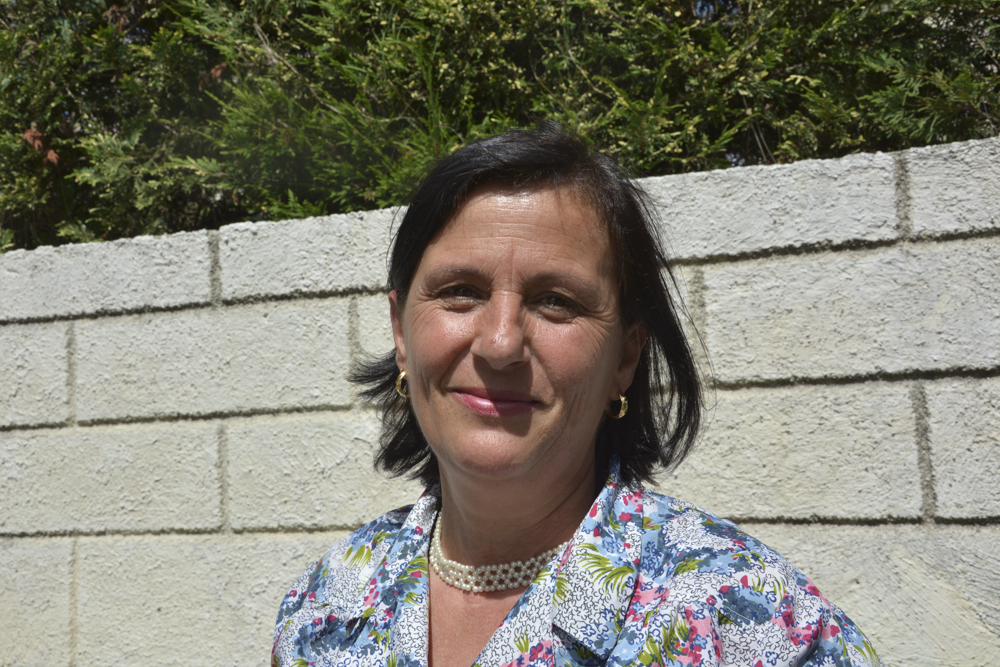
Zyrako Matohitaj, oilwoman, went on a hunger strike along with other women after their male colleagues’ health started to deteriorate. Photo: Erisa Kryeziu.
Being unemployed for a year and having missed 13 salaries, the economic situation of the oil workers became aggravated. On the 26th day of the strike, the women left the small room where they were staying at the Ballsh health center after reaching an agreement with Prime Minister Rama. They would receive an assistance of 40,000 lek (330 euros) per month for one year. This assistance is almost half of the miners’ monthly salary, which went up to 70,000 – 80,000 lekë (about 600 – 700 euros).
“We have proposed that the government undertake timely financial support for all these workers,” said Prime Minister Rama the night before the agreement was reached, on November 9, 2020. “It cannot be their salary because in fact the refinery is off, but of course we are not talking about an assistance salary.”
The period of government assistance for oil workers ends in October this year, while there are no signs of renewed activity in the refinery.
Since the end of the hunger strike, the Government has made no public communication regarding the Ballsh refinery.
The Ministry of Infrastructure and Energy said in the show Vetting, on ABC News Albania, that the state cannot have a concrete proposal to resume work since it does not own any shares of the refinery.
New unions, a hope for workers’ rights
The lack of representation by the traditional unions and their abandonment of protesting workers at key moments while fighting for rights in various sectors has provided fertile ground for the creation of new unions.
“For years, oil workers felt unrepresented,” said Dautaj, the SNB’s union leader. “Not even a few years ago, the [old] unions abandoned us during a rally we held at the Ministry of Energy in Tirana, marching for hours on foot.”
He believes that any legal representative of the workers that abandons them during protests for a fair salary automatically loses that title.
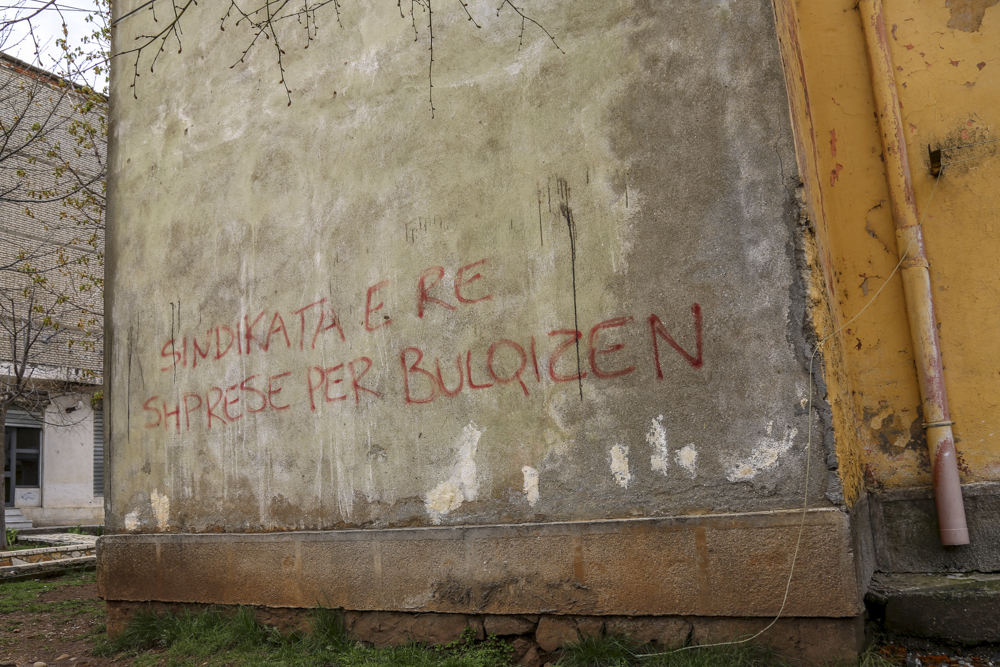
Creating the new union cost four miners of Bulqiza their job, but it brought hope to everyone. Photo: David Hardy.
The two main trade union groups in Albania, the Union of Independent Trade Unions of Albania (BSPSH) and the Confederation of Trade Unions of Albania (KSSH), have been very weak in their defense of workers, according to researcher Edlira Xhafa, director of the Global Labor University Online Academy, which offers master programs for trade unionists.
“While the early ’90s seemed to give some signs of the birth of an independent labor movement, the materialization of this potential stalled early on,” said Xhafa. “Here, the infamous decree of President Berisha in the early 1990s that transferred the properties of the Trade Unions to the two unions of that time played a special role.”
According to Xhafa, KSSH and BSPSH simply became private managers of their properties, which have provided them with a fat income for most of the period since then.
"Forming new democratic unions directly by workers is the best answer."
Edlira Xhafa
The need for organization and unionism cost four miners their jobs at AlbChrome in Bulqiza.
“It has been extremely difficult to form a union,” said Debreshi. “Considering who the owners are today, they lord over the galleries of Bulqiza and are quite powerful, connected with the state, with power, they are the richest in Albania, we talk of people like Samir Mane,” [owner of Balfin Group].”
According to Xhafa, in the case of Bulqiza the old unions cooperated with the owners to suppress the new organizations. Therefore, she thinks that the formation of new democratic unions directly by the workers is the best answer.
“They are not only a direct response to the irreversible failure of the old unions, but also to the historical need of workers to have a voice in the workplace,” she said.
"The unionism that appeared in Bulqiza brings hope and some fairer alternatives."
Elton Debreshi
On the morning of August 27, it was reported that Debreshi’s car had been attacked with explosives, an action that his supporters read as resulting from his activism for the rights of miners. But for Debreshi, although creating the new union came at a personal cost and led to the dismissal of the miners, its mission must continue.
“It is not like removing the president and 3-4 others will completely kill the union,” said Debreshi. “The union continued to develop and gain support by joining foreign global or European union associations.”
According to him, the trade unionism that appeared in Bulqiza brings hope and some fairer alternatives. Yet, it remains to be seen whether the experience in Bulqiza and Ballsh will affect the larger organization of workers in all sectors.
Feature image: David Hardy.






